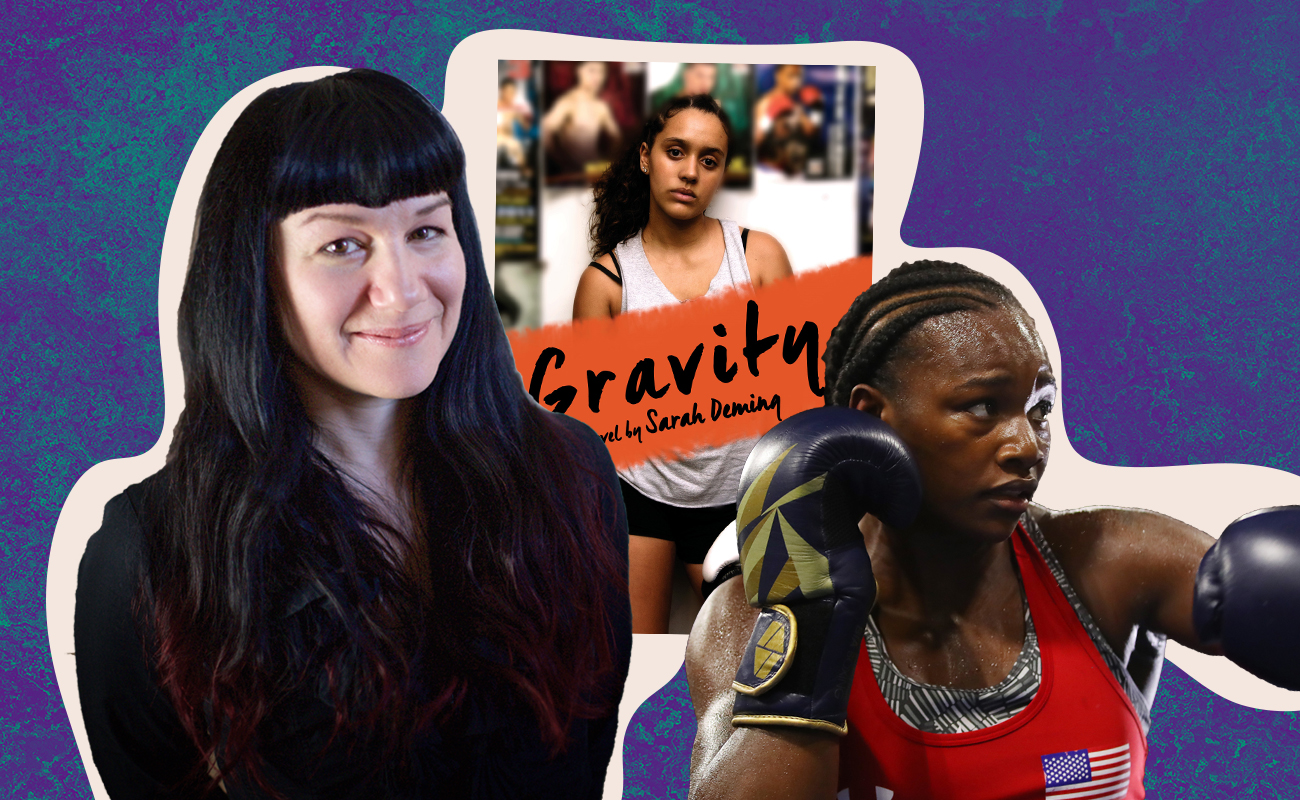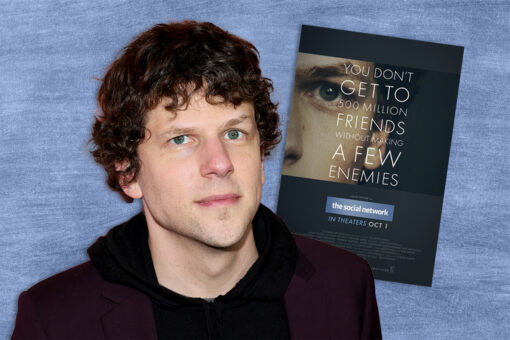Sarah Deming’s new YA novel Gravity tells the story of a Jewish Dominican teen girl named Gravity who becomes a boxer, eventually ending up at the Olympics. It’s based on the true story of boxer Claressa Shields, the youngest boxer at the 2012 U.S. Olympic Trials who went on to win gold — the first ever in women’s boxing – in the London games. Gravity also draws on Sarah’s own life; like Gravity, she is the daughter of a single Jewish mom. And like Gravity, she is a boxer (Deming no longer boxes professionally, but now works as a coach).
When I had the opportunity to chat with Deming over e-mail, we talked about misconceptions surrounding female boxers and Jews in sports, how all aspects of her identity (female, Jewish, boxer) influenced Gravity, and how boxing “cleared the way” for her career as a writer.
This interview has been lightly edited and condensed.
Why tell the story of a Jewish Dominican teenage boxer?
It’s not just Gravity’s story but the story of a whole community, the story of amateur boxing in America and how it helps people find themselves. So I needed to create a protagonist who would be relatable for a wide range of young people, yet one whose experience was close enough to my own that I could write with authority, weaving in pieces of my childhood. I liked the idea of Gravity having an identity that didn’t fit easily into any one category because this seems to be a common theme among many of the youth I have coached. Even being a woman itself can be an identity that feels troubled or troubling.
I made Gravity the daughter of a Jewish single mom because that’s my own background. Like me, she has a little brother she feels protective of. I was inspired to give her a Dominican father because of a very fierce, beautiful young woman I know whose father was a great Dominican boxer. That girl’s dad, like Gravity’s and mine, was not around much growing up. The longing for her absent father suffuses the story, and it motivates Gravity to seek a surrogate father in her coach. A lot of the best boxers grew up without a dad around. Boxing becomes their dad.
I love that Gravity is based on a true story — after reading the acknowledgments at the end, I went down an internet rabbit hole about Claressa Shields. How did Claressa’s career and life impact Gravity?
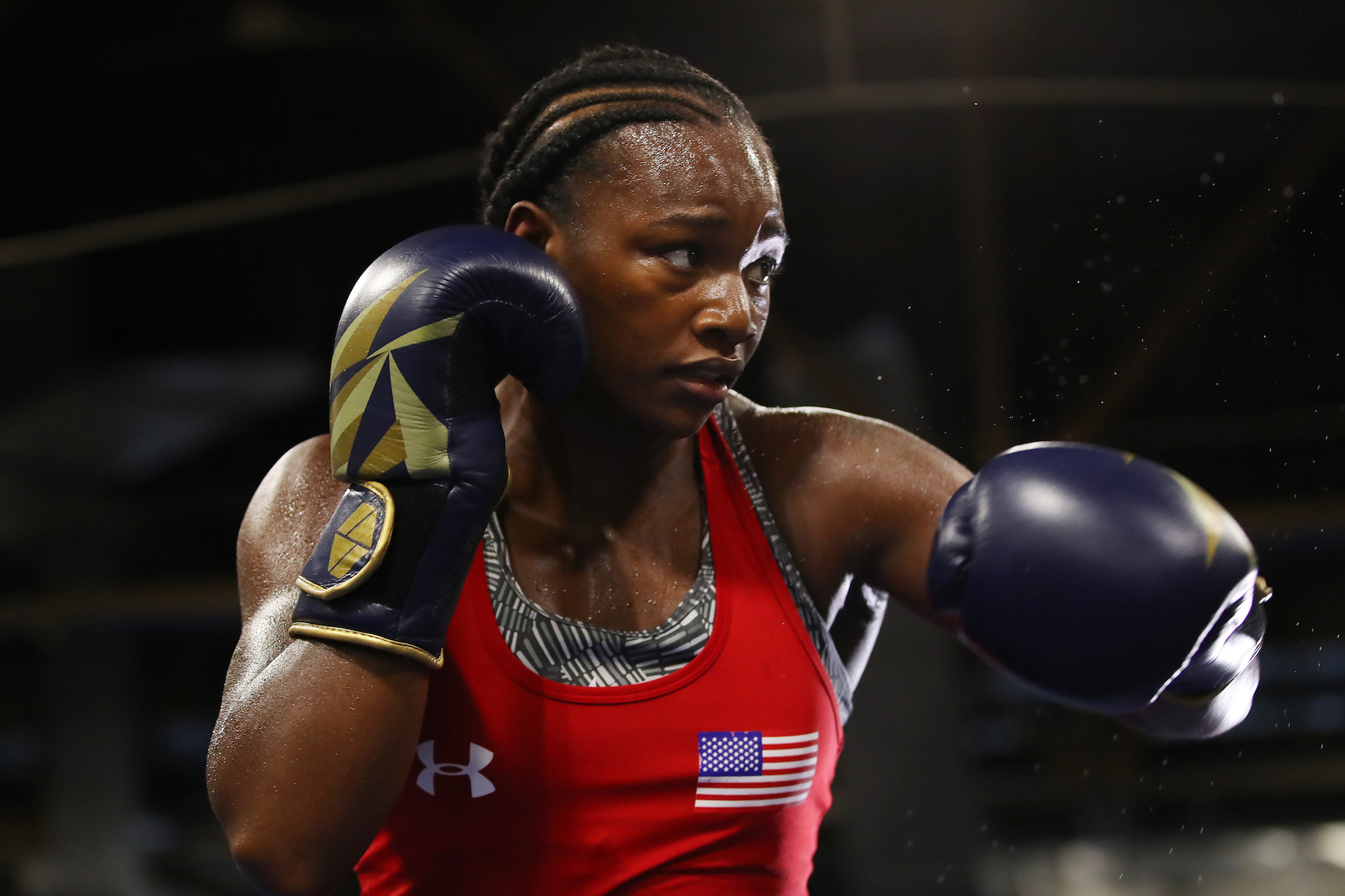 Claressa Shields works out (Photo by Gregory Shamus/Getty Images)
Claressa Shields works out (Photo by Gregory Shamus/Getty Images)
To me, she is one of the most inspiring humans on the planet. Reading about her cannot capture the power of seeing her live in the ring, and I’ve been incredibly lucky to see her fight all around the world. She’s only lost once in her life, and I’m one of the few writers to see that fight. A lot of Gravity’s boxing journey is lifted directly from Claressa’s story; I wrote a long profile of Claressa for the essay collection The Bittersweet Science that served as a sort of model for Gravity.
To make a funny analogy, Claressa is like Virginia Woolf to me. When I first read Woolf, I was like, “Women can be as brilliant as men. This is proof.” Woolf’s genius was the strongest possible argument against misogyny, an affirmation of who I could be. Claressa fights like that.
What does your Jewish identity mean to you?
Being Jewish is an important part of my cultural identity, but I don’t have an uncomplicated relationship with it. For one thing, I don’t have a Jewish last name, so sometimes people don’t know that I’m Jewish. My mom grew up in Shaker Heights, Ohio; our roots are from Hungary and Russia. When she was a kid, her dad said, “I will disown any of you who marry non-Jews.” My mom wound up marrying a white Presbyterian guy from Texas, and my aunt Donna (who is the inspiration for Auntie Rosa in Gravity) married a Catholic man from Ecuador, and Grandpa loved us all the same. Another classic Grandpa quote is: “Bacon is worth going to hell for.”
How did your Jewish identity influence the story, if at all?
It’s important not only to make your protagonist close to you, but also to give them important differences. The two things that I seized on early as differences between Gravity and me were: she is tall (I’m 5’2″) and she has a deep, unshakable faith in God (I’m basically agnostic). I needed Gravity to be a true believer, because Claressa is and so are all the best boxers. I think being in the ring at the highest levels forces you to put yourself in the hands of a greater power. Claressa kneels down in the corner of the ring and prays to Jesus before every fight, and Gravity recites the Shema.
There’s a bit in Gravity about how much she loves the Book of Ruth, and this is lifted from my childhood. Ruth is my mom’s name. There’s also a part in Gravity where she quits going to synagogue because the rabbi disapproves of women boxing. This is also true-to-life for me. My childhood best friend is Conservative-Orthodox and used to attend a temple where women couldn’t touch the Torah. We had a lot of heated teenage arguments about that! My politics often got in the way of my feeling like I was a real Jew. I got disinvited to the prom when I told my Jewish date that I had sympathy for the Palestinian people.
I read your essay about fighting in Madison Square Garden. How do you go from being a boxer competing on the biggest stage to a YA writer?
I think boxing cleared the way for me to be a writer, because it made me comfortable with failure. Boxing was the first thing I had ever loved enough to put in sustained, brutally hard work over a long period of time, all directed at a particular goal. I had to sacrifice a lot socially, too, because when a boxer is trying to make weight, she can’t go out and eat with friends, go out drinking, stay up late. But I loved it enough that this seemed like a good bargain, even if I took a loss at the end. And I lost a lot! More than I won.
Writing is the same. You need to be able to handle a lot of rejection and still keep believing in yourself. There’s the internal failure, too, that feeling of never quite getting close to the ideal book in your head. My favorite quote about it is Samuel Beckett’s: “Ever tried. Ever failed. No matter. Try again. Fail again. Fail better.”
What about your current role as a coach?
My coaching very much influenced the plotting and tone of the novel. As a coach, I’ve spent thousands of hours inside various gyms, drinking in the atmosphere. Boxing gyms are filled with humor and family, as well as a lot of sweat and struggle, and I hope that richness comes through in Gravity.
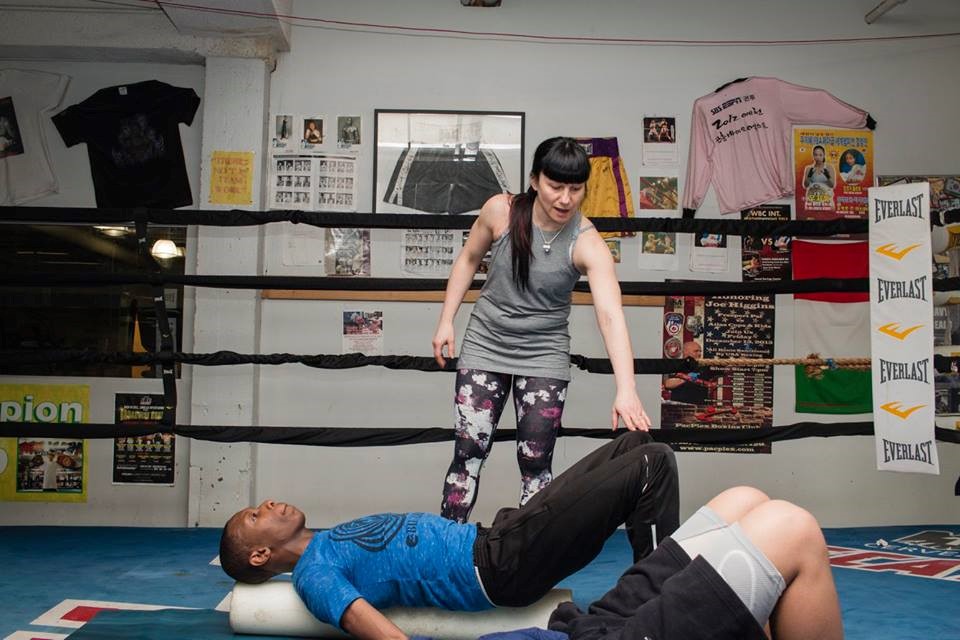 Sarah coaching
Sarah coaching
Another thing coaching has taught me is how difficult life really is for young underprivileged kids. I always believed abstractly that that there was a lot of inequity in our country, but working in a free community gym for the past eight years has been eye-opening. Some of our young people are scared to go to school. They face gang violence from classmates, metal detectors at the door, and some truly terrible teaching. Before I started doing this work, I didn’t know anyone who had died from violence. In eight years, three of the young people I’ve worked with have been murdered. It was important to me to include this in the story as well.
Have the kids you coach read Gravity? What do they think?
I paid my best student, Josh, to read an early draft and give me feedback, especially on the dialogue of the young characters and their use of social media. He did an amazing job. I recently sat down with him and recorded a little promo video in which he interviews me about Gravity.
He also wrote a beautiful review that I posted on my website.
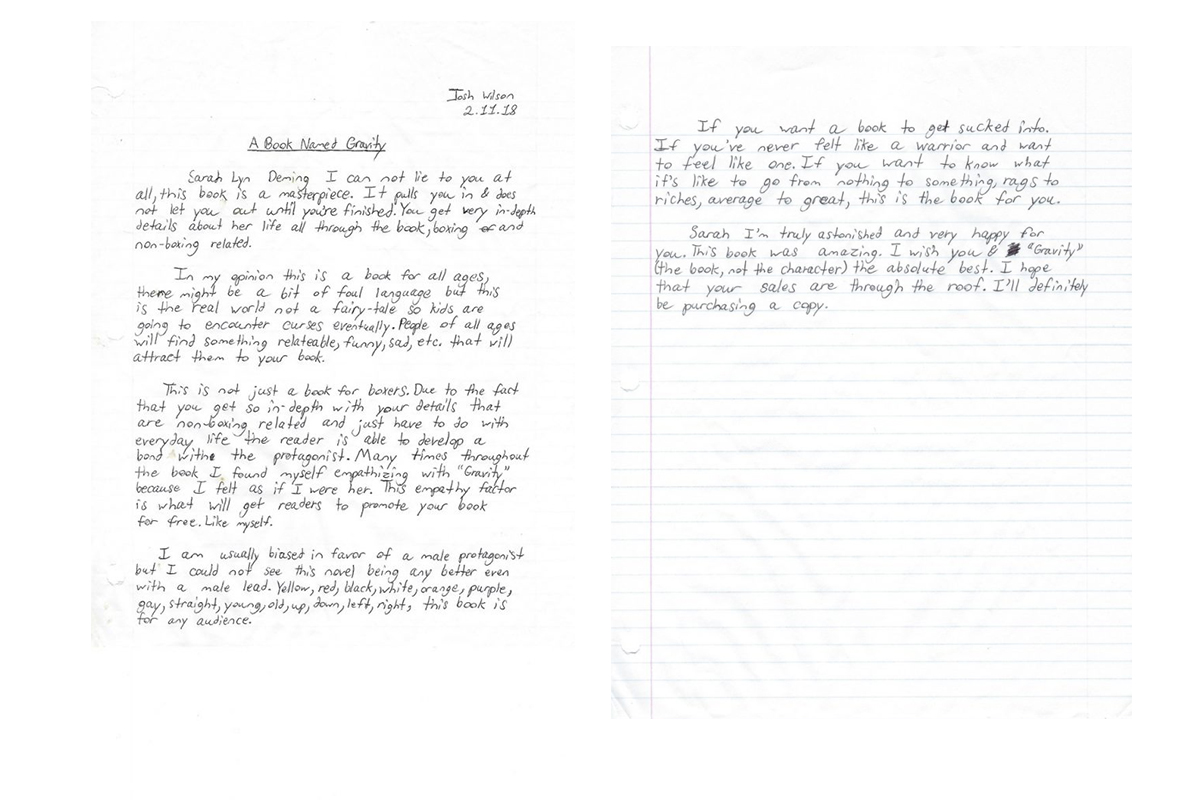
A lot of my students are reluctant readers, but I’m really hoping that once the book comes out, I can get more of them to read it. They get excited when I tell them that it’s about our gym!
What are the biggest misconceptions about female boxing?
The most common thing men would say to me when I was boxing is, “You don’t look like a boxer!” I’m not sure what they think a female boxer should look like!
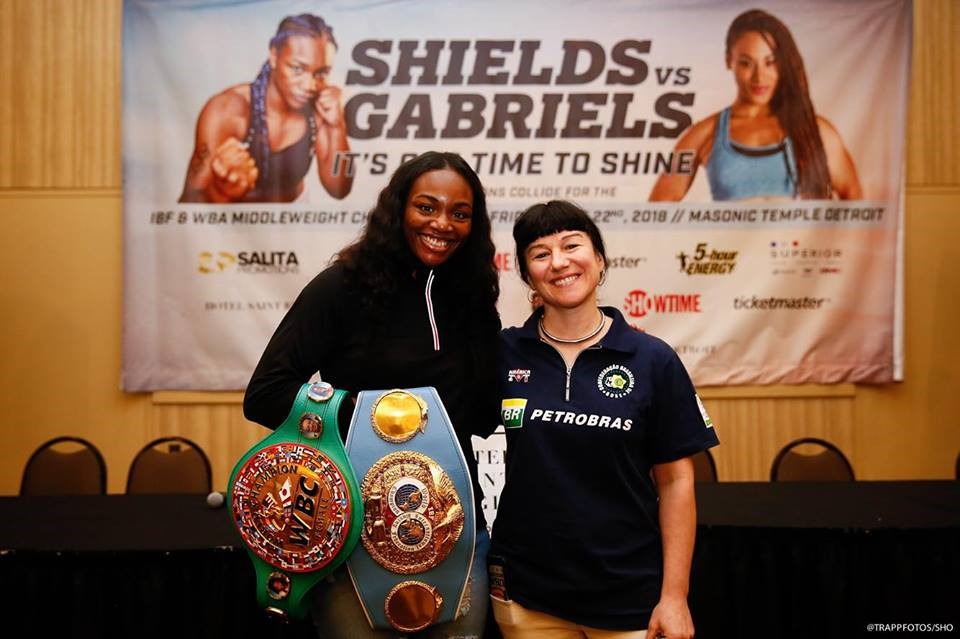
Claressa Shields and Sarah Deming (Image by Stephanie Trapp)
Male sportswriters will cover a fabulous boxer like Mikaela Mayer, who happens to be extremely beautiful, and their angle will be, “She looks like a model!” It’s telling that men are still allowed to write these drooling, superficial pieces and pass them off as journalism. There are so many stories to tell about Mikaela: about her dad, who travels the world to watch her fight; about her legendary coach Al Mitchell; about her technical improvements over the years, the patience she has shown as she climbed the ranks on the way to being a Rio Olympian, the way she has had to be the CEO of her own brand.
Women boxers are an incredibly diverse group. Diverse in every sense of the word: racially, socioeconomically, in gender expression and sexual orientation, in the way we relate to aggression outside the ring, and also in size, which might sound trivial but is really important: Small athletes aren’t at a disadvantage in our sport, because weight classes let you fight others of your stature.
Another thing men often jokingly say to me is, “Ooh, don’t hit me!” Or if my husband happens to be part of the conversation, they’ll say something to him like, “I guess you better watch out!” Imagine saying that to a male boxer, implying that he beats his wife!
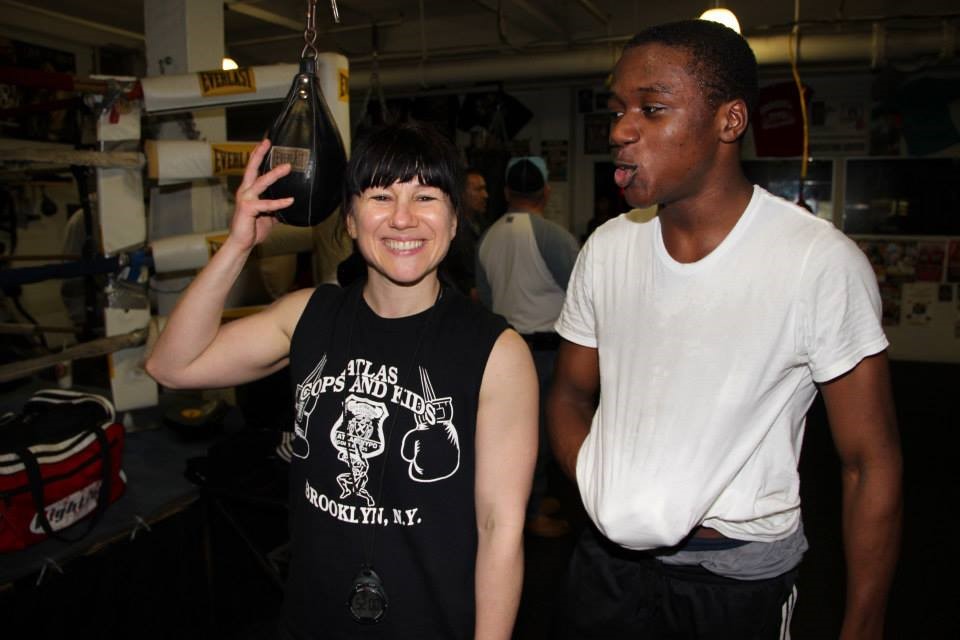 Image by Annie Bervin
Image by Annie Bervin
Jokes are the subconscious speaking. I think a certain kind of guy feels very threatened to hear that a woman boxes, that she is taking on that identity. There has been a lot of backlash against Claressa in the press because she has adopted a sort of Muhammad Ali-esque demeanor. She calls herself the GWOAT, which stands for the Greatest Woman of All Time, and she calls people out on Twitter and acts like a swaggering male athlete would in her position. It’s incredible to see the boy journalists freak out about it and write these scolding, paternalistic editorials.
I think this is a pretty common response to dominant female athletes across sports. There’s a powerful book called Citizen by the poet Claudia Rankine that everyone should read. Among other things, Rankine parses the racist and sexist representation of the Williams sisters in the sporting press.
Are there any misconceptions about Jews in sports?
Maybe just that there aren’t any! When I was young, I really loved Chariots of Fire because it was about a Jewish runner. I think Jews have a reputation for prioritizing intellectual achievements over physical ones. It appealed to me to create a Jewish sports heroine because I didn’t see much of that out there in the current marketplace.
Who are your athletic heroes?
Claressa Shields, of course. My current favorite boxer is Terrence Crawford, and my favorite boxers of the past are Marvelous Marvin Hagler and Bernard Hopkins. Honestly, anybody who has the guts to get into the ring is a hero to me!
Gravity is out November 12. Image of Sarah Deming in header by Gordon Eriksen and of Claressa Shields by Gregory Shamus/Getty Images.
